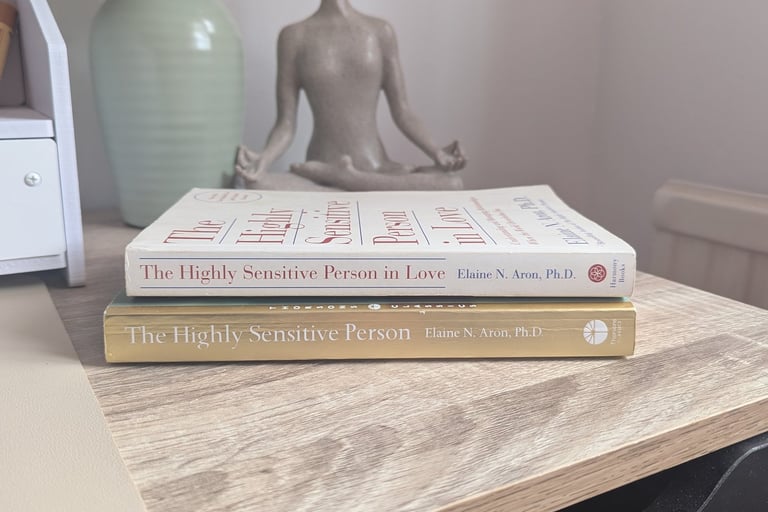

Is Being Highly Sensitive Just High-Masking Autism?
A heartfelt look at the overlap between being Highly Sensitive and autistic. Exploring nuance, research, and self-understanding with compassion.
Alexandra Planterose
10/22/20255 min read
Many people believe the Highly Sensitive Person (HSP) trait is simply another name for high-masking autism. This blog isn’t about proving one side right, instead let’s explore the nuance, the overlaps, and the evidence behind both perspectives.
It’s a question that brings up big feelings, and for good reason.
Is being Highly Sensitive really just Autism?


First, lets explore why this debate exists.
For decades, autism was under-diagnosed, especially in women and AFAB (assigned female at birth) people.
Many grew up feeling “different,” easily overwhelmed, or emotionally intense, but were told they were too sensitive, dramatic, or overreacting.
Without access to neurodivergent frameworks, a lot of people were misunderstood or even misdiagnosed.
Enter the HSP concept...


When the concept became mainstream, it finally offered language that made sense of people’s experiences.
For some, it was the first time they felt seen and understood.
But for others, it later felt as though autistic traits were being repackaged in a more “palatable” way, even delaying their autism diagnosis.
That’s why the HSP framework can feel empowering for some and frustrating for others.
In the 1990s, psychologist Dr Elaine Aron introduced the Highly Sensitive Person trait (Sensory-Processing Sensitivity).
The frustration is valid.
Many autistic people mask daily to survive in a neurotypical world. When deep sensitivity and high empathy are celebrated in HSPs but pathologised in others, it can feel ableist.
For those who’ve spent a lifetime hiding their true selves just to feel safe, it’s personal.
That pain deserves to be recognised and validated.
But while the lived experiences can look strikingly similar, research shows that high sensitivity and autism are connected and can co-exist, though they remain distinct experiences.


Where they overlap (and where they differ)
There’s no denying the similarities.
Both Highly Sensitive People and autistic individuals often experience:
Heightened sensory awareness (sound, light, touch)
Deep empathy and emotional intensity
Overwhelm in busy environments
A strong need for recovery and alone time
These shared traits explain why so many people relate to both identities.


It's possible to be Highly Sensitive AND Autistic
Many autistic people score high on measures of sensory-processing sensitivity, meaning they experience both neurodivergent wiring and heightened emotional or sensory awareness.
Likewise, some Highly Sensitive People later discover they’re autistic once they explore their traits more deeply.
The two can co-exist, and one doesn’t cancel out the other.
What matters most is understanding how your unique nervous system experiences the world, and finding the right support for you.
Sensory processing is one part of Autism, but it's not the whole picture.
Autistic people may also experience:
Social communication differences
Repetitive or focused interests
Executive-function challenges
Core traits that remain present from early life
HSPs, on the other hand, may be highly attuned and reflective, but they don’t typically experience those same developmental or cognitive differences.
Sensitivity is an evolutionary trait.
Research shows high sensitivity isn’t unique to humans.
It’s been observed in over 100 species; including dogs, primates, birds, and fish. In nature, more sensitive animals notice subtle changes in their environment and help their groups avoid danger.
This suggests sensory-processing sensitivity evolved as a survival strategy, not a disorder.
That’s a key difference: HSP isn’t a diagnosis or disorder - it’s part of natural human diversity.


The key difference:
The main difference lies in why these sensitivities exist and how broadly they affect life.
Autism is a neurodevelopmental condition that shapes how the brain processes information, communicates, and relates to the world from early life. It’s estimated to affect around 1–2 % of the population (though likely higher in under-diagnosed groups).
High Sensitivity (HSP) is a temperament trait; a natural variation in sensory and emotional depth found across all neurotypes. Research suggests around 15–20 % of people fall within this highly sensitive range.
In other words, HSP describes how deeply someone feels and processes, while autism describes how someone’s brain is wired overall.
If you are exploring the overlap
If you see yourself in both descriptions, you’re not alone.
Many people relate to traits of high sensitivity and later discover they’re also autistic, and some autistic people strongly identify with the HSP framework too. Both can co-exist.
I encourage you to explore both Sensory-Processing Sensitivity and neurodivergence to discover what feels most true for you.
Remember, self-understanding isn’t about finding the “right” label, it’s about discovering what helps you feel seen, supported, and safe in your own skin.
Take your time, stay curious, and know that your sensitivity is valid, whatever name it goes by.
What the research shows:
Because this topic often sparks debate, I wanted to include the science behind it in simple terms. So let’s look briefly at what the research actually says, because it’s easy to get lost in labels when we forget the science behind them.
The Highly Sensitive Person (HSP) trait [also called Sensory Processing Sensitivity ] was identified by psychologist Dr Elaine Aron in the 1990s. Her research found that around 15–20 % of people have a more responsive nervous system: they process stimuli more deeply, notice subtleties others miss, and are more easily overstimulated. This pattern has been observed across many species, suggesting it’s an evolutionary temperament, not a disorder.
In contrast, autism is a neurodevelopmental condition that shapes how the brain processes information from early life. Autistic people can also experience intense sensory sensitivity but usually alongside differences in social communication, executive function, and routine preference.
Studies comparing the two (like Liss et al., 2008 and Liss & Erchull, 2012) found that while sensory and emotional sensitivity overlap, HSPs tend to show higher empathy and typical social functioning, whereas autistic participants report broader developmental differences.
Neuroscience research (Jagiellowicz et al., 2016) found that HSPs show stronger activation in brain regions linked to awareness and empathy, echoing similar sensory processing patterns seen in autism, though the underlying causes differ.
And large-scale reviews (Greven et al., 2019) suggest that sensitivity exists on a continuum across all humans; meaning that both HSPs and autistic people may simply fall toward the “more sensitive” end of that spectrum, each for different biological reasons.
In short:
The research supports the idea that HSP and autism can overlap,
But also that they are distinct in scope, cause, and development.
Further Reading:
High Sensitivity & Autism
• Aron & Aron (1997) – Sensory-Processing Sensitivity and Its Relation to Introversion and Emotionality
• Aron, Aron & Jagiellowicz (2012) – Sensory-Processing Sensitivity: A Review in Light of the Evolution of Biological Responsivity
• Liss, Mailloux & Erchull (2008) – The Highly Sensitive Person and the Autism Spectrum: An Empirical Comparison
• Liss & Erchull (2012) – Sensory Sensitivity, Empathy and Attachment in Adults on the Autism Spectrum
• Greven et al. (2019) – Sensitivity: Differential Susceptibility to Environmental Influences
Ready to explore more?
✨ Book a FREE 30 minute collect call with me to discover how Hypnotherapy can help you!
✨ Browse the blog for HSP-friendly tools
✨ Discover the Sensitive Rewire hypnotherapy package
✨ Follow along on Pinterest or Instagram for calming tips & reflections
✨ Or subscribe below for regular updates!
Take gentle care,
Alex x
"Healing doesn't require you to toughen up."
Instead, I gently work with your sensitivity through subconscious healing and nervous system regulation, so you can feel safer and more empowered just as you are.


